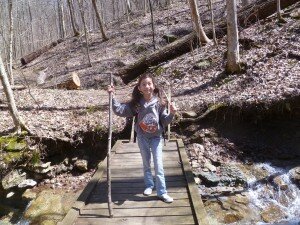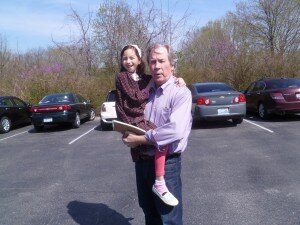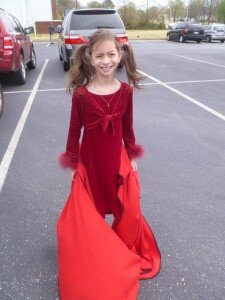Nashville and the future of journalism
 My brother, who's a columnist for the Oregonian, was in Nashville this past weekend receiving a Wilbur award for his columns (which were noted as 'religion columns') which is pretty funny in that he has never been a specialty religion reporter like me. But he had three columns on religion that won one of those stained-glass window trophies that the Wilbur people gave out. I won one in 2003 for something I did at the Washington Times but after awhile the trophy began to gather dust, so I placed the stained glass portion over the grave of my cat. It looked nice there.Anyway, I drove to Nashville on Saturday so we could have lunch, then wander about Cheekwood Garden, in the southwest part of town. Stephen, who turns 60 this year and I (who am younger but not by that much) were talking about the Future Of Journalism and how much of it is moving at speeds neither of us feel good about. Like the whole 'personal brand' thing. Used to be journalists kept themselves out of the typical story because the readers cared about who we were writing about but not about the scribe who was writing it, right? That has all changed according to links like this that talk about how the writer his or herself is now the star of the show. There was one paragraph: "More news organizations are recognizing that their competitive edge comes from having staff members who are subject-area experts the public trusts and relies on." That I thought was pure bosh because newsrooms have been chasing away their specialists for the past 4-5 years. How many media outlets are really hiring science, religion, fashion, food, travel, environmental or agriculture reporters? The only specialties with traction these days are politics, business, health and education.
My brother, who's a columnist for the Oregonian, was in Nashville this past weekend receiving a Wilbur award for his columns (which were noted as 'religion columns') which is pretty funny in that he has never been a specialty religion reporter like me. But he had three columns on religion that won one of those stained-glass window trophies that the Wilbur people gave out. I won one in 2003 for something I did at the Washington Times but after awhile the trophy began to gather dust, so I placed the stained glass portion over the grave of my cat. It looked nice there.Anyway, I drove to Nashville on Saturday so we could have lunch, then wander about Cheekwood Garden, in the southwest part of town. Stephen, who turns 60 this year and I (who am younger but not by that much) were talking about the Future Of Journalism and how much of it is moving at speeds neither of us feel good about. Like the whole 'personal brand' thing. Used to be journalists kept themselves out of the typical story because the readers cared about who we were writing about but not about the scribe who was writing it, right? That has all changed according to links like this that talk about how the writer his or herself is now the star of the show. There was one paragraph: "More news organizations are recognizing that their competitive edge comes from having staff members who are subject-area experts the public trusts and relies on." That I thought was pure bosh because newsrooms have been chasing away their specialists for the past 4-5 years. How many media outlets are really hiring science, religion, fashion, food, travel, environmental or agriculture reporters? The only specialties with traction these days are politics, business, health and education. We also discussed the Oregonian's new rule about posting online news several times a day. The Williamette Week describes it here and without divulging confidences, let's just say no one is thrilled about it. I mean sure, you can steal a headline from Google Trends about "Five Best Ways to Go Naked," write two paragraphs and watch your readership stats zoom for the next hour, but is this journalism? It all feels like one huge balloon that's going to pop at some point. Anyway, I bring all this up because one of our social media (class) assignments this week is describe what I'm doing to establish my personal brand online. Hmmm. Well, my brand over the past 30 years has been writing about religion in some form, and doing it well. I've been a religion reporter/editor part- or full-time at six newspapers. Most of my freelancing has been somehow connected with that world although I've diverged a bit into education reporting for CNN.com. But, with my life segueing from the newsroom to the classroom, is that what I'm all about?One thing Steve and I have in common is that over the years we've written books on mostly obscure topics that only a subset of people care about. He did a graphic novel on the oil mess in the Gulf of Mexico. My best book is on charismatics and people who live in covenant
We also discussed the Oregonian's new rule about posting online news several times a day. The Williamette Week describes it here and without divulging confidences, let's just say no one is thrilled about it. I mean sure, you can steal a headline from Google Trends about "Five Best Ways to Go Naked," write two paragraphs and watch your readership stats zoom for the next hour, but is this journalism? It all feels like one huge balloon that's going to pop at some point. Anyway, I bring all this up because one of our social media (class) assignments this week is describe what I'm doing to establish my personal brand online. Hmmm. Well, my brand over the past 30 years has been writing about religion in some form, and doing it well. I've been a religion reporter/editor part- or full-time at six newspapers. Most of my freelancing has been somehow connected with that world although I've diverged a bit into education reporting for CNN.com. But, with my life segueing from the newsroom to the classroom, is that what I'm all about?One thing Steve and I have in common is that over the years we've written books on mostly obscure topics that only a subset of people care about. He did a graphic novel on the oil mess in the Gulf of Mexico. My best book is on charismatics and people who live in covenant communities. None of that is going to sell as well as a book on Bruce Springsteen. But these were topics we both cared about and which needed writing about. But are they our brands? Usually after writing about a topic, ie my 2008 book on people who quit church (which is still the most popular thing I've ever written), I'm done with it forever. I've immersed myself in it for years and I Want To Move On.My take on it all is the same as this 2011 Gene Weingarten column, which is a howler but it's all too truthful on how branding is ruining journalism. I like Steve Buttry's take on it all when he redefines branding as as what you have a reputation for. I react better to that. Sooo, what am I good at? When I was working full-time in a newsroom, I was known for breaking a lot of the top - or unusual - stories. TWT really encouraged us to report on what other folks were not reporting on, which is how I broke a lot of unusual stuff, like the Abby Johnson story (she was the Planned Parenthood director in Texas who quit and became a pro-lifer). The story was run in a smaller publication (forget where but I think it was humming among the anti-abortion groups) and I picked it up and made it a national story. And once a story got in the Washington Times, other media would pick it up.
communities. None of that is going to sell as well as a book on Bruce Springsteen. But these were topics we both cared about and which needed writing about. But are they our brands? Usually after writing about a topic, ie my 2008 book on people who quit church (which is still the most popular thing I've ever written), I'm done with it forever. I've immersed myself in it for years and I Want To Move On.My take on it all is the same as this 2011 Gene Weingarten column, which is a howler but it's all too truthful on how branding is ruining journalism. I like Steve Buttry's take on it all when he redefines branding as as what you have a reputation for. I react better to that. Sooo, what am I good at? When I was working full-time in a newsroom, I was known for breaking a lot of the top - or unusual - stories. TWT really encouraged us to report on what other folks were not reporting on, which is how I broke a lot of unusual stuff, like the Abby Johnson story (she was the Planned Parenthood director in Texas who quit and became a pro-lifer). The story was run in a smaller publication (forget where but I think it was humming among the anti-abortion groups) and I picked it up and made it a national story. And once a story got in the Washington Times, other media would pick it up. That was a Times specialty: taking obscure stories and bringing them to national attention. I remember how some time after I left the Times, a big story came up about a scandal among a conservative evangelical group in the DC area and I read among some of the bloggers some wistful comments about me. Yes, they were wishing I was back on the beat, because they trusted me in that I knew what I was doing, in contrast to certain other local writers who hadn't a clue of what evangelicals believed or thought. So I did have a reputation and a brand as someone who 'got' how the religious world operated and thought and was able to translate that to secular outlets.But I'm not working full-time for a news organization now, so don't have the leisure of working on my 'brand' some 8-10 hours a day. If you are teaching college full-time or a full-time grad student, how do you work on your brand? On Twitter, I describe myself as a religion reporter but I also write about adoption, serpent handlers and journalism. Will say that I am still writing about religion for secular outlets, but not as much because I live in the middle of nowhere and I'm in school full time. Anyway, another discussion we're having in class is on metrics, the science of how many people are clicking on and engaging with your web site. This is not an exact science, as this Columbia University piece points out. But everyone is obsessed with getting readers, engaging with readers and keeping them glued to your site instead of sending them off to HuffPost. One suggestion on getting more readers is to engage them, as this piece in emedia explains. One problem though: this particular article talks about skewing content towards those who are most loyal to you, using the Dallas Morning News as an example. But the DMN, I happen to know, really stung some of their most loyal readers when they deep-sixed the country's best religion section a few years ago. Dallas is very devout and to just jettison the religion section with the excuse that it wasn't getting enough ads ( education and politics and other beats don't pay for themselves either), was crazy and the decision to kill the section turned a lot of locals against the paper for good.Well, so much to read, so little time. More on metrics can be found here. My other assignment was to ramp up my Linked-In profile. I've gotten 441 connections without even trying. Sooo...I've started 'following' more news organizations and trying to link with VIPs and anyone else who's interested in me. As for my brand, am still working on that one. I have to create yet another web site in a week or two to showcase my work from an InDesign class, so I get I'd better get cracking on thinking up one.
That was a Times specialty: taking obscure stories and bringing them to national attention. I remember how some time after I left the Times, a big story came up about a scandal among a conservative evangelical group in the DC area and I read among some of the bloggers some wistful comments about me. Yes, they were wishing I was back on the beat, because they trusted me in that I knew what I was doing, in contrast to certain other local writers who hadn't a clue of what evangelicals believed or thought. So I did have a reputation and a brand as someone who 'got' how the religious world operated and thought and was able to translate that to secular outlets.But I'm not working full-time for a news organization now, so don't have the leisure of working on my 'brand' some 8-10 hours a day. If you are teaching college full-time or a full-time grad student, how do you work on your brand? On Twitter, I describe myself as a religion reporter but I also write about adoption, serpent handlers and journalism. Will say that I am still writing about religion for secular outlets, but not as much because I live in the middle of nowhere and I'm in school full time. Anyway, another discussion we're having in class is on metrics, the science of how many people are clicking on and engaging with your web site. This is not an exact science, as this Columbia University piece points out. But everyone is obsessed with getting readers, engaging with readers and keeping them glued to your site instead of sending them off to HuffPost. One suggestion on getting more readers is to engage them, as this piece in emedia explains. One problem though: this particular article talks about skewing content towards those who are most loyal to you, using the Dallas Morning News as an example. But the DMN, I happen to know, really stung some of their most loyal readers when they deep-sixed the country's best religion section a few years ago. Dallas is very devout and to just jettison the religion section with the excuse that it wasn't getting enough ads ( education and politics and other beats don't pay for themselves either), was crazy and the decision to kill the section turned a lot of locals against the paper for good.Well, so much to read, so little time. More on metrics can be found here. My other assignment was to ramp up my Linked-In profile. I've gotten 441 connections without even trying. Sooo...I've started 'following' more news organizations and trying to link with VIPs and anyone else who's interested in me. As for my brand, am still working on that one. I have to create yet another web site in a week or two to showcase my work from an InDesign class, so I get I'd better get cracking on thinking up one.